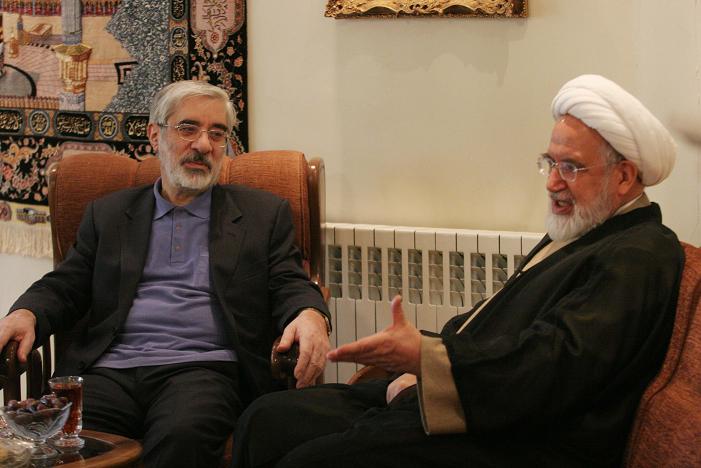Iranian Judiciary Defends Continued House Arrest of Green Movement Leaders
In yet another vague statement effectively signaling support by the Iranian Judiciary for the continuation of the four-year-long house arrest of Iran’s Green Movement leaders, Iranian Judiciary Spokesperson Gholamhossein Mohseni Ejei said during his weekly press conference on January 5 that “If one day the background is set, there will be a trial, and naturally the people will also be informed.” He continued, “So long as a judicial case is not formed for them, there will be no indictment, and even if there is an indictment, according to the law, we cannot provide information about it.”
On January 4, 2015, in an open letter to the Head of the Iranian Judiciary, Sadegh Larijani, Member of Parliament Ali Motahari called continuation of the house arrests illegal and demanded a fair public trial for Mir Hossein Mousavi and Mehdi Karroubi Motahari’s personal website was blocked a day after the open letter was published, according to ISNA. In the letter he wrote, “You can hold a fair public trial without fear of an imaginary sedition.” Iranian officials have consistently referred to the peaceful protests that followed the disputed 2009 presidential election in Iran as “sedition.”
Commenting on state officials’ previous statements that the decision to put the Green Movement leaders under house arrest was made by Iran’ Supreme National Security Council, Motahari said in his letter that the Supreme National Security Council only has authority to put leaders of a social movement “under house arrest until the unrest has ended,” under critical circumstances such as street riots. “This Council must release the individuals under house arrest after the emergency circumstances have [ended] or deliver them to the Judiciary for prosecution,” wrote Motahari.
In his January 5, 2015 press conference, in response to Ali Motahari’s open letter, Judiciary spokesperson Mohseni Ejei told reporters that “some of the contents of this letter are pure lies and prosecutable, and they will be addressed in the near future.” Ejei did not elaborate further.
Departing from earlier statements by the Tehran Chief of Police and other officials who had previously said that Iran’s Supreme Leader, Ali Khamenei, had approved the imposition of the house arrest, Head of the Judiciary Sadegh Larijani said on December 31, 2014, that the decision to put Mir Hossein Mousavi, his wife Zahra Rahnavard, and Mehdi Karroubi under house arrest had been made by the Supreme National Security Council. “Whenever the resolution from the Supreme National Security Council changes, the Judiciary is prepared to hold a trial,” he said. Larijani added that holding a trial would be on the condition that Mousavi and Karroubi “not say what they want in court and refrain from inciting public emotions” in court.
In response to Larijani’s statements, Motahari wrote in his letter, “It is only natural that any suspect would wish to say his piece to the public and this is his right, especially in the case of the referenced suspects who have been deprived of stating their points for the past several years, and have conversely been accused of many different charges such as [seeking] overthrow [of the state] and relations with foreign enemies.”
Verbal attacks on Mir Hossein Mousavi and Mehdi Karroubi have increased drastically in recent weeks. Some state officials and conservative figures have announced in official statements that the verdict for the two former presidential candidates should be death, and that they have remained under house arrest because of Iranian Leader Khamenei’s mercy on them.
However, some government officials have demanded trials for the prominent politicians and an end to the house arrests of Mehdi Karroubi, Mir Hossein Mousavi, and his wife Zahra Rahnavard, which have been ongoing since February 2011. Ali Motahari, one of the officials who view the house arrest as unconstitutional, wrote an open letter to Iranian President Hassan Rouhani on October 7, 2014, in which he asked him to take action to lift the house arrests of the opposition leaders, based on the law.
One of Rouhani’s election campaign promises in 2013 was “the necessity of ending the house arrest” of Mousavi, Karroubi, and Rahvanard. Nonetheless, 1.5 years after his election, Rouhani has not taken any tangible public action toward this end.
The UN Secretary General and the UN Special Rapporteur for human rights in Iran, as well as governments around the world, have called for an immediate end to the house arrests of the three Green Movement leaders, who have been held without charge in Iran for almost four years.







